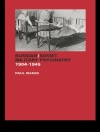At the end of World War II the Allies faced a threefold challenge: how to punish perpetrators of appalling crimes for which the categories of ‘genocide’ and ‘crimes against humanity’ had to be coined; how to explain that these had been committed by Germany, of all nations; and how to reform Germans. The Allied answer to this conundrum was the application of historical reasoning to legal procedure. In the thirteen Nuremberg trials held between 1945 and 1949, and in corresponding cases elsewhere, a concerted effort was made to punish key perpetrators while at the same time providing a complex analysis of the Nazi state and German history. Building on a long debate about Germany’s divergence from a presumed Western path of development, Allied prosecutors sketched a historical trajectory which had led Germany to betray the Western model. Historical reasoning both accounted for the moral breakdown of a ‘civilised’ nation and rendered plausible arguments that this had indeed been a collective failure rather than one of a small criminal clique. The prosecutors therefore carefully laid out how institutions such as private enterprise, academic science, the military, or bureaucracy, which looked ostensibly similar to their opposite numbers in the Allied nations, had been corrupted in Germany even before Hitler’s rise to power. While the argument, depending on individual protagonists, subject matters, and contexts, met with uneven success in court, it offered a final twist which was of obvious appeal in the Cold War to come: if Germany had lost its way, it could still be brought back into the Western fold. The first comprehensive study of the Nuremberg trials, The Betrayal thus also explores how history underpins transitional trials as we encounter them in today’s courtrooms from Arusha to The Hague.
Kim Christian Priemel
Betrayal [EPUB ebook]
The Nuremberg Trials and German Divergence
Betrayal [EPUB ebook]
The Nuremberg Trials and German Divergence
Acquista questo ebook e ricevine 1 in più GRATIS!
Lingua Inglese ● Formato EPUB ● Pagine 496 ● ISBN 9780192563743 ● Casa editrice OUP Oxford ● Pubblicato 2018 ● Scaricabile 3 volte ● Moneta EUR ● ID 9424933 ● Protezione dalla copia Adobe DRM
Richiede un lettore di ebook compatibile con DRM












